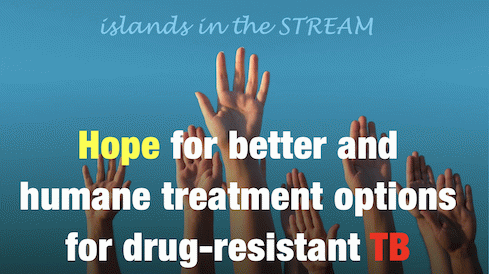STREAM study gives hope for better treatment of drug-resistant TB
SHOBHA SHUKLA - CNS

'Islands in the STREAM': New hope for better treatment options for those with drug-resistant tuberculosis
(Image by CNS) Details DMCA
When TB bacteria becomes resistant to most effective anti-TB medicines, then it no longer responds to them. As a result, drug-resistant TB becomes harder to treat, treatment is longer and outcomes are not satisfactory, and toxicity and side effects are deeply worrying. That is why new TB drug research and development is so critical as we need more effective and shorter therapies with no toxicities and side effects. One major news of better therapies for drug-resistant TB was shared at the opening of the world's largest conference on TB and lung health.
Findings of STREAM Stage-2 clinical study demonstrate that Bedaquiline based two regimens - an all oral 9-month regimen, and a 6-month injection-containing regimen are safe and over 82% effective in treating multi-drug resistant tuberculosis (MDR-TB). STREAM (Standardised Treatment Regimen of Anti-TB Drugs for Patients with MDR-TB) Study results give hope.
Noted researcher Dr ID Rusen, who is a Senior Vice President for research and development at Vital Strategies (which is the sponsor for the STREAM study) shared this exciting news at the opening press conference of the 2022 Union World Health Conference on Lung Health, that is being held virtually during November 8-11.
Until 2016, the recommended treatment for MDR-TB typically included 7,200 pills and 240 injections and took 20-24 months to complete.
STREAM was the first large-scale, multi-country clinical trial to examine shortened regimens for MDR-TB. In 2017, STREAM Stage-1 confirmed that a 9-month injectable treatment regimen was non-inferior to the longer regimen. Now, STREAM Stage-2, results of which were published in The Lancet, has demonstrated that both, a 9-month all-oral Bedaquiline containing regimen and a 6-month bedaquiline containing regimen, that includes 8 weeks of a second-line injectable, have superior favourable outcomes compared with the 9-month injectable-based regimen, with very little acquisition of phenotypic resistance to core drugs.
STREAM Stage-2 was a randomised, phase-3, non-inferiority study conducted in 13 hospitals in 7 countries (Ethiopia, Georgia, India, Moldova, Mongolia, South Africa and Uganda). Incidentally, India is the only country from WHO South East Asia Region to join the study with two sites - The National Institute for Research in Tuberculosis (NIRT) in Chennai of Indian Council of Medical Research (ICMR), and BJ Medical College (BJMC) and Civil Hospital in Ahmedabad.
(Note: You can view every article as one long page if you sign up as an Advocate Member, or higher).





